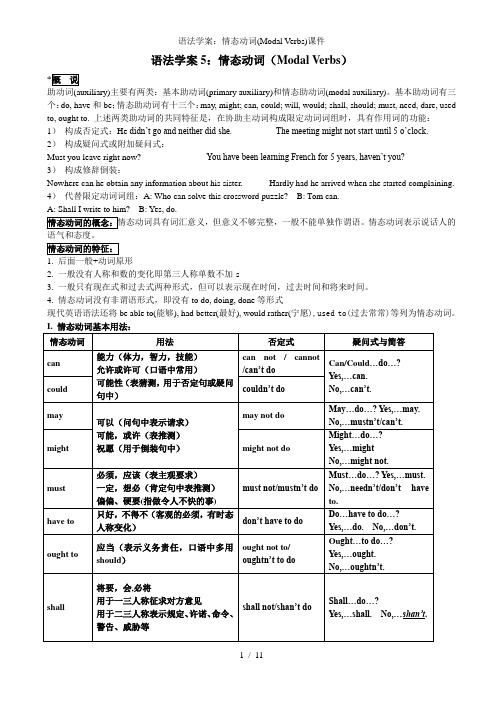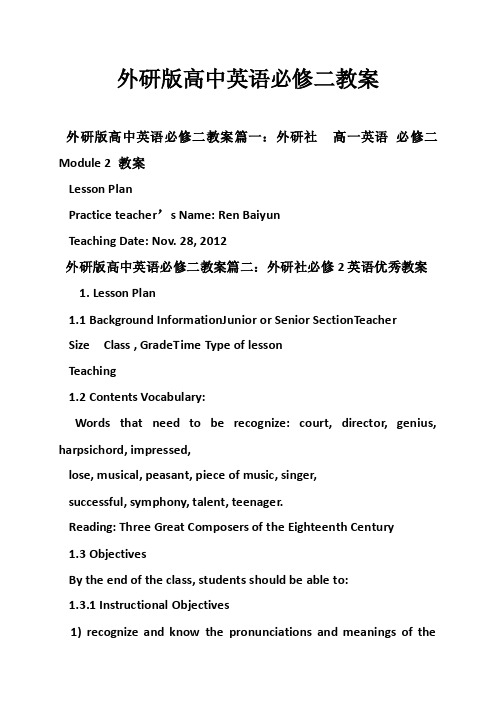2012高一英语教案:情态动词(Modal Verbs)(外研版必修2)
语法学案情态动词Modal Verbs课件

语法学案5:情态动词(Modal Verbs)助动词(auxiliary)主要有两类:基本助动词(primary auxiliary)和情态助动词(modal auxiliary)。
基本助动词有三个:do, have和be;情态助动词有十三个:may, might; can, could; will, would; shall, should; must, need, dare, used to, ought to. 上述两类助动词的共同特征是,在协助主动词构成限定动词词组时,具有作用词的功能:1)构成否定式:He didn’t go and neither did she.The meeting might not start until 5 o’clock.2)构成疑问式或附加疑问式:Must you leave right now? You have been learning French for 5 years, haven’t you?3)构成修辞倒装:Nowhere can he obtain any information about his sister. Hardly had he arrived when she started complaining.4)代替限定动词词组:A: Who can solve this crossword puzzle?B: Tom can.B: Yes, do.语气和态度。
1. 后面一般+动词原形2. 一般没有人称和数的变化即第三人称单数不加-s3. 一般只有现在式和过去式两种形式,但可以表示现在时间,过去时间和将来时间。
4. 情态动词没有非谓语形式,即没有to do, doing, done等形式现代英语语法还将be able to(能够), had better(最好), would rather(宁愿),used to(过去常常)等列为情态动词。
M4U2 Modal verbs学案(good)

Modal verbs(情态动词学案)•主要的情态动词:can/could; may/might; must, need, dare, shall, should/ought to, will/would. •情态动词的基本特点:(1)情态动词具有一定的词义,如表示能力,许可,责任,猜测等。
(2)情态动词不能独立使用,必须和另一个动词的原形一起构成谓语;即:情态动词+动词原形。
(3)情态动词一般无人称和数的变化。
(4) 情态动词的否定式:情态动词的疑问式:一、can/could/ be able to do1. can 1)表示能力,意思是―会,能,可以‖。
could 表示过去的能力。
(1)令我们惊讶的是,她会开车但不会骑车。
To our surprise, she a car but a bike.(2)她三岁时就会说一点英语了。
She ___________ a little English when she was 3.be able to do 表示能力, 可以用于各种时态,比较正式.(1)明天你可以来吗? _____ you ______________tomorrow?(2)我认为戴维能够处理这个问题。
I think David __________________ this problem.(3)两年后,他的汉语能说得非常流利了。
Two years later, he ______________ very good Chinese.was/were able to do sth.could do sth.(1) There was a big fire in the building, but luckily everyone ____ escape at last.A. couldB. was able to(2) _______ I use your cell phone for a while? I left mine in my bag.(3) Finally every passenger on the burning bus ________ escape with the help of the local police.(4) In his sixties, my grandpa _______ still read without glasses.(5) He didn’t agree to my plan at first, but I __________ persuade him in the end.2) 表示许可。
高一英语英语必修Unit语法情态动词课件

The guest may arrive this afternoon. ---Can he attend the meeting?
---Yes, he_m__a_y. I am not sure.
3. 表示祝愿,位于句首 eg. May you succeed! May you have a good journey!
5.must的主要用法
1. 必须。must表主观“必须” have to 表客观“不得不”
I must go home this Saturday. I’ve got a cold, so I have to see a doctor. ---Must I stay here? ---Yes, you must./
• 情态动词的特点: 1.情态动词自身都有一定的意义, 但不能表示正在发生或已经发生的 事情,只表示期待或估计某事发生。 2.情态动词除ought和have外,后 面必须接不带to的不定式。 3.情态动词没有人称和数的变化, 也没有非谓语形式。
1. can和could
1. can的主要用法是: A. 表能力
eg. The girl can dance very well. be able to 通过努力做成某事 He was able to reach Mount Qomolangma in 2000. B. 表示说话者的推测﹑事物的可能性:(否、疑) eg. Can the news be true? C. 在口语中, can可以表示请求或允许:
情态动词(modal verb)表推测用法教案设计

情态动词(modal verb)表推测用法教案设计一、教学目标:1. 知识目标:要求学生掌握使用表示推测的情态动词。
2. 能力目标:学会表推测情态动词在实际生活中的运用。
3. 情感目标:让学生爱上英语课堂,鼓励他们学习英语的自信心。
4. 学习策略目标:设法使学生掌握使用英语进行造句,增强上课的积极性。
二、教学重难点:1.教学重点:学会用情态动词must, can ,could,may ,might等表推测的用法以及各个相近情态动词间的区分。
2.教学难点:各个表推测情态动词的用法区分。
三、教学过程:(一)师生互相问候;(二)检测复习与导入(目的是复习情态动词以及引出情态动词表推测的用法)由二则谜语引入要教的情态动词:(1).You can’t catch his body; you can’t see his shadow. When strong, he shakes the house, when weak, the tree leaves.(2).What can you catch but not throw?让学生猜,猜完以后,说出这里面都有一个can,这个时候它的意思是什么以及在这里“表推测”的作用,由此导入主题。
(三)情态动词表示推测的用法1. 首先请看下面的这个顺口溜:这个顺口溜介绍了can (could), may (might), must表“推测”时所适用的句式的区别。
其含义如下:can不肯,即:can (could)一般不用于肯定句;may不问,即:may (might) 一般不用于疑问句;must肯定不否问,即:must一般仅用于肯定句,不用于否定句和疑问句。
2.must表示推测的用法must很有把握的推测,其意为“一定会”“肯定会”,只用于肯定句,一般不用于否定句或疑问句。
表示对现在或未来的情况作推测,后接动词原形;表示对过去情况的推测,接动词完成式。
must + be doing,表示对现在正在进行的情况的推测。
外研版高中英语必修二教案

外研版高中英语必修二教案外研版高中英语必修二教案篇一:外研社高一英语必修二Module 2 教案Lesson PlanPractice teacher’s Name: Ren BaiyunTeaching Date: Nov. 28, 2012外研版高中英语必修二教案篇二:外研社必修2英语优秀教案1. Lesson Plan1.1 Background InformationJunior or Senior SectionTeacherSize Class , GradeTime Type of lessonTeaching1.2 Contents Vocabulary:Words that need to be recognize: court, director, genius, harpsichord, impressed,lose, musical, peasant, piece of music, singer,successful, symphony, talent, teenager.Reading: Three Great Composers of the Eighteenth Century1.3 ObjectivesBy the end of the class, students should be able to:1.3.1 Instructional Objectives1) recognize and know the pronunciations and meanings of thefollowing vocabularies by showing pictures, situations, word-formation rules, chunks, collocation, teacher’s explaining and guessing though the context:court, director, genius, harpsichord, impressed, lose, musical, peasant, piece of music, singer, successful, symphony, talent, teenager.2) grasp the key words, understand the main idea of the reading materials ;3.3.2 Educational Objectives1) strengthen their motivation and interest in learning English through the interesting class activities;2) build up the cooperative spirit by pair working and group working;3) talk about some famous composers;4) use the cognitive strategies to learn new words.3.3.3 Personal ObjectivesTeacher tries to be more passionate and involved all students in my class.3.4 Focal Points1) Students are able to use the reading skills to grasp the key words, Organize information by tables.2) Students are able to write a short passage to introduce their favorite musicians.3.5 Difficult PointsStudents are able to use the reading skills to gain information and compare the information.3.6 Procedures and Time Allotment3.6.1 Getting Students Ready for Learning (3 minutes)Step 1 GreetingsTeacher greets students with simple communication.T: Good morning, boys and girls. How are you today?Ss: …T: Shall we begin our class?Ss: Yes.3.6.2 Revision (2minutes)Review what we have learned yesterday.3.6.3 Pre-reading (6 minutes)Step 1 Enjoy a piece of music by Beethoven on PPT.Step 2 Vocabulary presentationTeacher shows some pictures about the three great composers of the eighteenth century; at the same time, students learn some new words:court, director, genius, harpsichord, impressed, lose, musical, peasant, piece of music, singer, successful, symphony, talent, teenager.Teacher pays some attention to students’pronunciation. Thenteacher leads students to the text by asking questions.3.6.4 While-reading (20 minutes)Step1 Skimming the passage for the main ideaRead the passage quickly and choose the best title in Ex2 on P22 ---Three Great Austrian Composers---Three Great Composers of the Eighteenth Century---Three Great Child ComposersStep 2 Scanning the passage for specific information Read the passage again and answer the questions. Which of the composers....1. Were born in Austria?2. Was born in Germany?3. Had a good singing voice?4. Died before his fortieth birthday?5. Became deaf?6. Met each other?7. Had fathers who were musicians?8. Had a father who wasn’t a musician?Step3 Read the passage carefully and fill in the form.About Haydn外研版高中英语必修二教案篇三:高一英语Module 2 No Drugs 教案外研版必修2Module 2 No Drugs 教学案例设计教学年级:高一课题名称:Module2 No Drugs ---Listening and Vocabulary & Speaking 教材版本:外研版授课时间:45分钟一、学生分析班上的学生刚从初三升入高一的学习时,由于进行全英教学,有些学生还不是很适应,特别是从镇、农村考上来的学生,在听说方面有比较大的困难。
情态动词(Modal Verbs)

另一类意思涉及必须做某事或允许做某 事之类的意思:情态动词可以用来表示 某人必须做某事、某人能做某事,如果 某事发生(或不发生)就会好一些,或 者某事是许可或禁止的。
一、表示有把握的程度 情态动词可以表达对于某一事实 或事件有把握的各种不同程度。
a完全有把握(肯定的或否定的)
1. shall用于第一人称: I/We shall be away tomorrow. I shan’t be late on Wednesday. 2. will 用于各种人称: That’s the phone. That’ll be Tony. Things will be right. It won’t rain this evening. You’ll be right.
情态动词 modal verbs
情态动词 情态动词 的 特点
1)有特定的词义 ) 2)没有人称和数的变化 ) 3)其后加动词原形(do), have done ,be doing. )其后加动词原形
易混易错用的情态动词
1。区别must / have to 。区别 Must表示人在主观上认为的必要、必须、一定要 表示人在主观上认为的必要、 表示人在主观上认为的必要 必须、 Have to表示受环境或习惯支配的客观必要 表示受环境或习惯支配的客观必要 不得不” 能用于更多时态。 “不得不”,能用于更多时态。 1)Soldiers ________obey officers. must have to 2)It’s raining outside.We_________stay at home. 3As he had broken his leg, he had to , ______lie in bed.
can’t, couldn’t
Unit2Usinglanguge(Modals2)课件-高一英语外研版

他也许不在家。
may/might 表推测
2. may/might可以推测现在的情况、正在发生的情况、过去已经发生
的情况以及将来的情况。
(现在)
• He may/might be at home now(. 此刻)
• He may/might be sleeping now.
Using language
Modals (2)
Modals
What do the words in bold indicate: an order, a request, ability or possibility? The words in bold indicate possibility.
Jean: IYeoxupmecutsytobueatrierefdeenlionwg!tired now!
Jean: Look at those two guys dressed as chickens! Oh, they’re
waving at us! MThaeyybemtahye/ym’rieghfrto/mcould obuerfsrcohmooolu. r school.
昨天他不可能看电视了,因为他知道快要考试了。
• can’t/couldn’t have done 表示对过去事实推测,意为 “不可能做过……”。
can/could 表推测
Exercise
1. Although you __ca_n___ find bargains in London occasionally, it’s generally not a cheap place to shop.
高中英语:module2grammar教案(外研版必修2)

用心爱心专心Module 2 No DrugsGrammar Teaching Aims: Knowledge and Skill Enable the Ss to master the important words, understand the passage and get to know the dangers of smoking and taking drugs. To get Ss to master the reading skills of scanning and skimming .To get Ss to know the gramma cal rule ————the infini ve of purpose and the adverbial of result the infini ve of purpose and the adverbial of result .Teaching Contents :Grammar 1 The infini ve of purpose +Grammar 2 Adverbial clause of result Teaching Procedures :Step 1 Presenta on. Match the uses of the word to with the sentences. A. To indicates arrangement. B. To indicates purpose. C. To follows certain verbs. I stole something every day to pay for the drugs. Teacher Wang is to meet us this a ernoon. He told me to take them to a shop in a nearby street. I con nued to buy cannabis from the same man for about six months. Suggested answers: B A C C Step 2 Explana ons: How many of them break the law in order to pay for their drugs? We can also say: How many of them break the law to pay for their drugs? How many of them break the law so as to pay for their drugs? Adam went to the man so as to buy cannabis. We can also say: Adam went to the man to buy cannabis. Adam went to the man in order to buy cannabis. Summary : (1)in order to /in order not to 可放于句首或句中。
- 1、下载文档前请自行甄别文档内容的完整性,平台不提供额外的编辑、内容补充、找答案等附加服务。
- 2、"仅部分预览"的文档,不可在线预览部分如存在完整性等问题,可反馈申请退款(可完整预览的文档不适用该条件!)。
- 3、如文档侵犯您的权益,请联系客服反馈,我们会尽快为您处理(人工客服工作时间:9:00-18:30)。
情态动词(Modal Verbs)一.概念和特征表示说话人对某一动作或是状态的态度的动词。
情态动词具有一定的词义,但不能独立作谓语,要和后面的动词原形一起作谓语,它没有人称和数的变化,具有助动词的作用,即用来构成否定句、疑问句及用于简单回答。
二.类型1. 只用作情态动词的:must can∕could ma y∕might ought to2. 既可作情态动词也可作实义动词的:need dare3.可作情态动词也可作助动词的:shall ∕ should will ∕ would4.具有情态动词特征的动词短语:have to used to would rather had better 三.用法1.Can∕Could⑴. 表示能力,相当于be able to。
Can you speak English?He could swim when he was 5Can只能用于一般现在时和一般过去式,而be able to可用于各种时态。
She has been able to play the piano for 3 years.⑵.表示征求意见,许可,could比can的语气要委婉,相当于may。
Can I smoke here?Yes,you can.∕No,you can’t.She asked whether she could smoke here.You can go with us if you like.⑶. 表示推测,can比could可能性大, 用于肯定句、否定句、疑问句均可。
Accidents can happen on such rainy days.It can’t be true.Can∕could +V原形表示对现在的状态特征推测Can/could +be doing表示对正在进行的动作的推测Can/could +have done表示对过去的推测He can’t be at home now.He can be studying now.He could have gone to school. It’s Sunday.但是情态动词表示推测时其反义疑问句应根据动词的实际事态而变化。
⑷. could have done 本能够,本可以You could have borrowed my car. I wasn’t using it.You could have come earlier.⑸表示说话人的惊异、怀疑、不相信的态度(主要用于否定句、疑问句和感叹句中)Can he be working till so late?How can you be so careless!2. May /Might⑴. 表示征求意见,请求和许可。
May I smoke here? Yes , you may. No , you mustn’t/’d better not /can’t.You may smoke.⑵. 表示推测,may可能性比might大,不如can语气强烈。
可能也许,通常用于肯定句中。
ma y/might+v原形表示对现在的状态特征推测ma y/might+be doing表示对正在进行的动作的推测ma y/might+have done 表示对过去的推测At present, there may be some problems.They might have lots of work to do now but I’m not sure.This might be done by Tom.Let’s speed up. They may be waiting for us.⑶. 表示祝愿,用于倒装句。
May+主语+动词原形。
May you succeed!May he live to 100 years!May you have a good life!⑷. may/might as well+V原形“最好”“不妨”“还是…的好”It’s too late. You might as well not go.3. Must⑴表示说话人主观看法及强烈劝告“一定要必须”同have to,只用于现在或将来,但是have to表示客观条件环境迫使必须,可用于各种时态。
mustn’t 表示禁止,用以告诉别人不要做什么。
don’t have to和needn’t都是不必没有必要用以回答must提问的疑问句。
You must have a passport if you want to go aboard.You can go out with your friend but you must come back before 11 at night.I can’t see clearly so I have to wear glasses.Must I do it now? Yes, you must. No, you needn’t/don’t have to.⑵表示推测,通常用于肯定句中,“一定”,很有把握,语气最强烈。
其否定形式为can’t /couldn’tMust+V原形表示对现在的状态特征推测Must+be doing表示对正在进行的动作的推测Must+have done表示对过去的推测He must be ill. I can see it from his face.Something must be burning. I can smell it.Someone must have entered this room yesterday, for my books have been moved.⑶表示偏要、固执He must come and ask her questions when she was busy.As I was about to start to work, the telephone must phone.4. Need⑴表示“需要”或“必须”,作为情态动词时没有人称和数的变化,多用于疑问句和否定句中。
肯定句中用must/have to/ought t o/should.You needn’t explain.Need I take money? Yes, you must./No, you needn’t.作为实义动词时有人称和数的变化,后面要跟带to的不定式。
I need to go to Beijing this Sunday to attend a book fair.Do I need to leave my telephone number and address?⑵needn’t have done 表示本没有必要做某事。
I needn’t have bought so much wine——only three people came.5. Dare表示“敢”,作为情态动词时没有人称和数的变化,多用于疑问句和否定句中。
过去式为dared. How dare you say “I’m not fair”?I daren’t stay at home alone at night.You will be punished if you dare break the rule.作为实义动词时有人称和数的变化,后面要跟带to的不定式。
This student doesn’t dare to raise questions in class.Do you dare to drive a car on such a crowed street?I dare to swim in the river.6. Shall⑴用于第一、三人称疑问句中表示征求意见或请求。
Shall we put off the sports meet until next month?Henry is waiting outside. Shall he come in now?⑵用于二、三人称陈述句中表示说话人的命令、警告、威胁、决心或许诺等感情色彩。
You shall get an answer tomorrow.If you do something wrong, you shall be punished.Nothing shall stop me.7. Should⑴作为shall的过去式用于第一、三人称疑问句中表示征求意见或请求。
Mr. Li asked if he should get his permit tomorrow.⑵表示义务职责或是给别人提出建议“应该”。
相当于ought to,但没有ought to语气强烈。
ought to否定形式为ought not to或oughtn’t to, 其一般疑问形式要将ought 放在主语前。
I think today’s children should learn to respect their elders.You ought to apologize to Joan.⑶表示说话人的感情色彩,如惊奇、愤怒、失望等。
“竟然”I’m surprised they should refuse our invitation.⑷表示很大的可能性,“应该”。
They should arrive now.⑸should have done 本应该做某事You should have invited me to your wedding, but you for got.8. Will/Would⑴表示请求,would语气更加委婉。
Will you come this way, please?Would you open the window, please?⑵表示意志、愿望、决心。
I won’t do that again.He said he would fight against AIDS.⑶will 表示习惯性动作“总是”“惯于”;would表示过去经常习惯做同used to, used to的否定和疑问形式都有两种,分别借助于did和used。
Fish will die out of water.The old man is strange. He will sit for hours without saying anything.You will regret if you lose such a good chance.After dinner, he would sit around Grandpa, listening to his stories.He used to be careless./He usedn’t to be careless. /He didn’t use to be so careless.9. had better (not) do sth /had better have done最好做…/最好做了…You’d better have a try.You’d better have started earlier.10. would rather (not) do sth/would rather have done 宁愿…/宁愿做了…I’d rather have refused his offer.。
